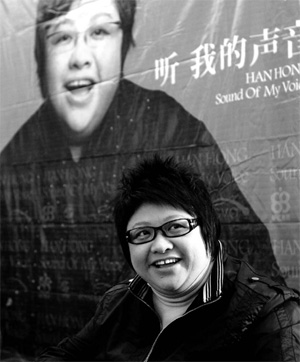Profiles
Eye on the Grammy
By Chen Nan (China Daily)
Updated: 2010-02-06 10:16
 |
Large Medium Small |
Pop singer Han Hong believes the nation's ethnic minorities will make China famous for music. Chen Nan reports
Just listing all the titles that singer/songwriter Han Hong holds, is exhausting. But each of them seems to sit lightly on the pop singer.
Han is a member of the National Committee of the Chinese People's Political Consultative Conference and of the National Youth Federation. Her most recent appointment is deputy head of the Cultural Troupe of the Air Force of the People's Liberation Army.
|
Han Hong says she has to shoulder more responsibility after being appointed as deputy head of the Cultural Troupe of the Air Force of the People's Liberation Army. |
Serving in the troupe takes up a lot of time but she enjoys it, Han says. She sits in on daily meetings and does reports every morning from 8 to 11 am. She works with her colleagues on new programs and organizes regular shows.
"I have been fascinated with the army since I was a teenager. So when I got the job, I felt honored," she says. "Earlier, singing was the only thing on my mind when I woke up in the morning. But now, I have a new life thanks to the job.
"But I discovered my first strand of gray hair not long after I got the job and many more have sprouted since," laughs the 39-year-old, pointing to her neatly-cut short hair, that she has worn in the same style for more than a decade.
She says she wants to help young singers from the troupe get more performing opportunities.
"As a singer, I could just be myself. But now I have to shoulder a bigger responsibility," she says.
However, Han also values having some time to herself.
"To be honest, it is really hard for me to balance my work at the troupe and my own singing career," she says before meeting up with fans of her new album, Listen to My Voice, in Beijing and Shenzhen recently.
The album was released online last October and has been downloaded more than 26 million times. She also plans to record an English album.
"China has many musical talents but few get noticed. I want to sing in English so that more Chinese singers get heard in Western countries. Having a Chinese musician's name on the list of Grammy award winners is not just a dream," she says.
"Being alone and meditating are important for a singer to write songs. But now I can hardly find any time to myself," Han says.
Her new album, she says, took her seven years to complete - from songwriting to post-production.
She invited an international production team to work on the album, including Grammy award winner Keith Olsen. Popular Chinese writer Guo Jingming, known as a sharp and controversial writer, penned the lyrics for four tracks on the album.
"I like the challenge of fresh ideas in music because it throws up so many possibilities," she says. "Working with US musicians showed me how technically advanced they are. But the most important thing is doing original music.
"When the American producer heard my voice, he was impressed, saying it was very Westernized. He even wondered if I was from abroad," she laughs. "I grew up in a place where people sing loudly."
Today's young singers, Han says, have more access to Western music and idolize stars such as Britney Spears and Beyonce, which is not a good thing for original Chinese music.
"It is true that Western singers are trendsetters. But we have so many great musical elements in our own country, such as the music of the ethnic groups of Yunnan, Xinjiang and Tibet. Why don't we treasure them and put them in the pop stream?" she says.
Ever since her debut album of 1997, Rays over the Snowcapped Plateau, was released, she has been a household name thanks to her blend of pop music and Tibetan tunes. Hometown, her first popular single, expressed Han's deep affection for her birthplace Xigaze in Tibet.
In all her subsequent six albums, Han has included at least one Tibet-inspired song, such as Heaven's Road, The End of Heaven, and Comeback - all tracks from her latest album. She also sings songs of other ethnic groups such as the Uygurs and Mongolians.
"Tibetan music is the basis of my songs. I also want to introduce more ethnic music in pop songs. I think that is the real, original voice of Chinese singers," she says.
Starting off as a singer in 1988, Han earned her place in the pop music scene with her distinctive high pitch and lyrics.
She attributes her singing talent to her mother, a well-known Tibetan folk singer.
"Artists of the older generation sang from the heart, and this deserves our respect," she says.
Although Han laughs often, reflecting her optimistic personality, her road to fame was fraught with difficulties. She has neither stunning looks nor a beautiful figure, in a time where these seem to matter more than singing talent. "I went through a hard time when I started singing. But thanks to those days of being alone, I got to write my songs," she says.
In 2003, she held her first sold-out concert at the Capital Gymnasium, which her mother also took part in. A year later, she held a charity concert at her hometown and donated all the earnings to charity. Another high point was when she sang at the Closing Ceremony of the 2008 Olympic Games.
"Even today, the Chinese like to listen to singers of the early 1990s, such as Na Ying and Mao Amin. Classic songs will always be remembered.
"People say nowadays it is tough to do music, let alone make albums. But I believe there are still some people who buy CDs and I would like to sing for them.
"When I retire, I can pick a CD off the shelf and relive the stories behind each song."














